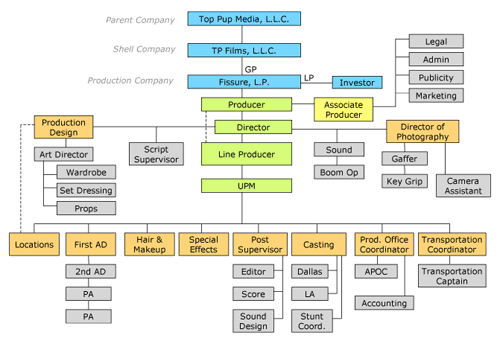Building the team
It’s amazing how a movie production works! It’s literally a small company, and I’m the CEO, CFO, CMO, (all other O’s), and General Manager. And with this small company, I will have to hire, manage and run this business for the length of the production (most likely about two months). We have payroll, taxes, work for hire contracts, hiring, firing, schedules, milestones, and maybe even a cubicle.
Note to self: go rent “Office Space” again.
I’m glad I have 16 years of corporate business experience. I’m familiar with org charts, managerial issues, process definitions, workflow, etc. I’m finding that a movie production is very similar. Here’s the org chart for our production.

As the director, my first three key hires are: Unit Production Manager (UPM), Production Designer (PD) and Director of Photographer (DP). I need to find a UPM who can manage most of the other team members of the production. The PD and DP are more visual and require direct management from the director.
As producer/director, I need a UPM who can manage a lot of the team hiring and management so that I can focus on the key issues like directing and bringing this show to life.
It’s interesting when you look at the differences between a Line Producer and UPM. The Line Producer is an opening credit, and it’s a role that is much more coveted than an UPM role. It’s a producer credit. The UPM credit appears at the end of the movie, but did you know that typically, the first credit you see after the movie ends is the UPM credit? Interesting.
Here’s something I found on the web about what a Line Producer does. Good stuff.
Line Producer
The Line Producer in the film and television industry is involved in the whole process of producing feature films, television and corporate videos. He works closely with the Production Coordinator and Production Manager.
Central Aspects
• Dealing with paperwork such as letters, forms and records
• Organizing or supervising other people
• Planning how work is to be carried out
Secondary Aspects
• Being involved with music, drama or dance performance
• Keeping accurate records or reports
• Making agreements through negotiating and bargaining
• Work involving teamwork and co-operation
Other Aspects
• Working under pressure
• Being away from home regularly
• Working evenings or weekends
Work Activities
The Line Producer, Production Manager and Production Coordinator work on the schedule of a production in terms of the time and days required for each stage of the production (research, rehearsal, shooting, editing, post-production). They work together in organizing/booking the crew, cast, locations, facilities required.
The Line Producer goes out on the set or shoot with the crew and his/her primary function is as a trouble-shooter on the set. The Line Producer ensures that everything required is organized and in place for the Director and the rest of the crew so that production can proceed as scheduled.
The Line Producer would be responsible for the daily expenses of the crew and getting receipts for all expenditure, and would often be responsible for determining overtime requirements. If archive footage is being used in a production, it’s the Line Producers’ job to source it or oversee whatever research is needed to source extra footage; to negotiate the use of same and to ensure that everything is returned to source after use.
The Line Producer also works on post-production and would be responsible for booking personnel required at that stage; voice-overs / narrators for example and any music that’s required, whether it’s looking after copyright regulations or organizing an original score.
The Line Producer generally negotiates legal and statutory contracts. He/she logs and transcribes interviews recorded, necessary for the edit stage and works on post-production with the Director and Editor. The Production Manager and Production Coordinator report back to the Line Producer on progress at all stages.